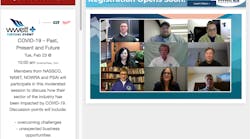Latest from Industry Event News
Sponsored
WWETT+ Virtual Event Offers Conferences, Online Marketplace
WWETT+, a virtual event held as a complement to the Water & Wastewater Equipment, Treatment & Transport (WWETT) Show was held February 23 through the 25th. The show included product spotlights and exhibits from a wide array of manufacturers in categories which included pipe inspection, pipe repair, wastewater management, drain cleaning, mobile services, pumping, chemical treatment and more.
While the virtual event was a stand-alone, it was also intended to "wet" the appetite of attendees for a live event which will be held in-person June 29 through July 2 in Indianapolis, IN. Registration is still open for what is recognized around the industry as "The premier event for municipalities, plumbers, portable sanitation professionals, septic contractors, sewer contractors and wastewater professionals."
In addition to video product demonstrations and virtual exhibits, the WWETT+ even included conference sessions on a wide variety of topics as well as networking opportunities. Some topics included, Identifying a Normal User: What Onsite Systems Expect to Treat; Jetting Nozzle Logic – A Common Sense Approach to Choosing the Right Nozzles; and Leveraging an Asset Management System to Benefit Your Business. For attendees who might be pressed for time, WWETT Show Shorts, special 20-minute sessions were offered with such topics as How to Have Tough Conversations and Bodies Don't Lie - Body Language Basics.
COVID Panel Discussion
WWETT+ kicked off with a panel session, COVID-19 Past, Present & Future. The session was moderated by Sheila Joy, the Executive Director of the National Association of Sewer Service Companies (NASSCO). Panel members included representatives from the National Association of Wastewater Technicians (NAWT), the Portable Sanitation Association International (PSAI) and the National Onsite Wastewater Recycling Association (NOWRA).
The discussion started by harking back to the earliest days of the pandemic, "When they cancelled the NCAA tournament and baseball's spring training," Joy said. Panelists discussed the protective measures they had put in place (PPE, social distancing etc.), and how it could sometimes be difficult to remain vigilant as the months wore on.
One panelist described how their company had made it all the way to Christmas without any employees or employee families getting infected, and then three members of their executive team tested positive all at once; a wake-up call that led to refocusing efforts at sanitation, disinfection and other protective measures.
Also in the early days of the pandemic, NASSCO and other associations worked hard to get wastewater and sanitation workers labeled as "essential" by the EPA, highlighting the importance of advocacy and strong ties to both state and federal governments.
For many panelists, one of the most difficult parts of the pandemic was negotiating the various business stimulus programs available. For one panelist, it seemed as if his banker, his CPA and his lawyer were giving him different answers with every passing day. Luckily, he was able to depend on a good team of financial professionals and get back to work in the field. Right now his business is on a firm enough footing that he feels comfortable refusing the second round of PPP loans.
Then the discussion moved on to one of the most important, but perhaps least discussed topics the pandemic has brought to the fore: mental health. The construction industry ranks #2 for risk of suicide, and very high for risk of drug (particularly opioids) abuse. Combine that with the pressures surrounding COVID, including unemployment or loss of hours, having an unemployed spouse or partner, childcare, elder care and a host of other issues, the situation is a mental health perfect storm.
But, the pandemic has also been an opportunity to discuss issues of mental health openly and honestly with employees and coworkers. It can be, said one panelist, approached like any other health or safety issue, such as dealing with corrosive chemicals or dangerous equipment. It is important to:
- Look for triggers and warning signs among coworkers and employees
- Devote resources to address the problem
- Give people channels outside the company to discuss their problems or talk to outside experts
The mental health of workers in the industry is not a short-term challenge. Tools, techniques and training to address the problem need to be part of every manager's toolkit moving forward.
Looking to the future, the panel discussed crisis management planning. COVID caused businesses across the country to dust off and actually implement their crisis plans—but the next crisis, whatever shape it might take, could be out there. All panelists urge that attendees review their crisis plans regularly and update them as needed.
In forming and adopting such a plan, networking is key. Share ideas with your team, with your employees, and don't be afraid to reach out to member associations. Since no good plan, as they say, "survives first contact with the enemy," don't be afraid to adapt that plan to suit changing conditions. One panelist said that his company had nine different divisions, and each one was affected slightly differently by the pandemic. They were constantly adapting it to suit the specific needs of specific employees.
Another panelist made the point that a crisis management plan doesn't need to be huge or complex. Any business, of any size, can put a plan in place. Reach out to national organizations for the help and resources you may need.
Sheila Joy thanked all the participants and urged them to keep the conversation going even after the virtual event had concluded.
Steve Spaulding | Editor-inChief - CONTRACTOR
Steve Spaulding is Editor-in-Chief for CONTRACTOR Magazine. He has been with the magazine since 1996, and has contributed to Radiant Living, NATE Magazine, and other Endeavor Media properties.


